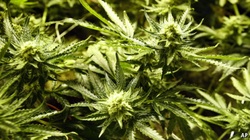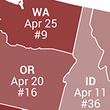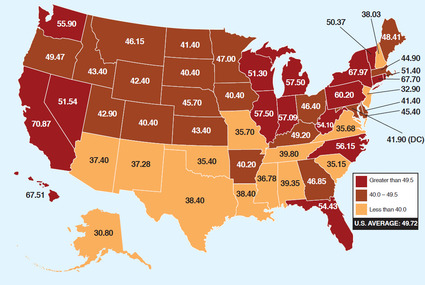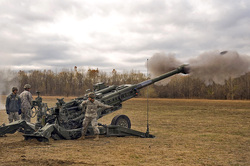WE were a little surprised to see this somewhat cautionary (if not critical) piece on the Babbage Science & Technology blog at The Economist which, with its European bent, is far from a "conservative" rag. WE laugh as much at Reefer Madness as everybody else, but found this pretty sobering.

BAKED BRAINS
April 16, 2014 - The Economist
LATER this month, Washington will hold an unusual lottery: it will select 334 lucky winners of licences to sell recreational marijuana in the Pacific-Northwestern state. If all goes to plan, some of those pot shops will be serving stoners (who in Washington can already possess small recreational quantities of the drug) by early summer. Colorado permitted existing medical-marijuana outlets to start selling recreational pot on January 1st, although brand new recreational retailers will not open until October; so far the state has issued some 194 licences. And even though marijuana is still technically illegal nationwide under the Federal 1970 Controlled Substances Act, U.S. Attorney General Eric Holder recently said he is monitoring Washington’s and Colorado’s experiences, and “would be glad to work with Congress” to re-categorise marijuana as less dangerous on the Controlled Substances List.
Hans Breiter, a professor of psychiatry and behavioural sciences at Chicago’s Northwestern University, worries that the rush to promote recreational use is reckless, and that not enough thought is being given to the balance between costs and benefits. In a study published today in the Journal of Neuroscience, Dr Breiter and a group of researchers from Northwestern, Massachusetts General Hospital and Harvard Medical School found that the size, shape and structure of parts of the brain are changed in teens and young adults who smoke weed as little as once a week. Earlier studies have focused only on tetrahydrocannabinol (THC, the main psychoactive component of pot) affects the brains of animals or intensive, dependent human users—and found evidence of impaired learning, memory, attention and decision-making. But those studies did not consider the effects of casual use.
Those effects appear to be significant. Dr Breiter and his team used high-resolution MRI scans to examine the brains of 20 young people aged 18 to 25 years old who smoked pot recreationally—but who were not, according to psychiatric testing, addicted to it. Twenty pot-free controls in the same age range were also studied, and all participants were closely matched in terms of age, sex (nine males and 11 females in each group), race and years of education. Each pot user was asked to estimate how much, and how often, they used the drug over a three-month period. And everyone was rated for cigarette and alcohol use—pot smokers drunk more—and the study controlled for these.
Although THC takes its toll on several parts of the brain, animal studies of prolonged exposure to the compound have shown that two regions—the amygdala and nucleus accumbens—are especially likely to be affected. The amygdala helps regulate and process emotions (such as craving) and emotional memories. The nucleus accumbens helps assess what is bad or good (such as a drug-induced “high”) in a person’s environment, and makes decisions based on that. Physiological changes to these regions could therefore mean that an individual’s ability to make pleasure-related decisions—such as deciding to stop smoking pot—may be impaired.
The researchers’ MRI scans showed a number of such physiological changes. It found structural abnormalities in the density of grey-matter (which constitutes most of the brain’s neuronal cell bodies), in both the amygdala and nucleus accumbens, along with changes in their volume and shape. In addition, their analysis of marijuana users showed reduced grey-matter density in other regions of the brain, including the prefrontal cortex. Numerous previous studies have shown that dysfunction in the prefrontal cortex is associated with decision-making abnormalities in addiction. And other functional-MRI and magnetic-resonance-spectroscopy studies have confirmed that marijuana use may affect how this region functions.
All this matters because both scientists and policymakers continue to distinguish between “heavy, addictive use” and “recreational use” among the 19m Americans who, according to the National Survey on Drug Use and Mental Health, report recent marijuana consumption. A similar distinction is made by other countries too. The new research suggests that this is at least a shaky line to draw, as even modest recreational pot-smoking seems to set the brain on a path to addiction—and perhaps to other types of cognitive impairment found in earlier studies. The same, of course, goes for alcohol and tobacco, but the risks there are widely advertised. Time, perhaps, for a similar marijuana-related educational campaign before more states go to pot.
by P.H. (at the Economist), Washington D.C.
About Babbage
Reports on the intersections between science, technology, culture and policy, in a blog named after Charles Babbage, a Victorian mathematician and engineer
______
Note: WE didn't ever quite take a position pro or con on the marijuana initiative, though we thought folks should question the big-government tax issues and the coming legal and bureaucratic bungle-battles that have played out pretty much as described.













 RSS Feed
RSS Feed
